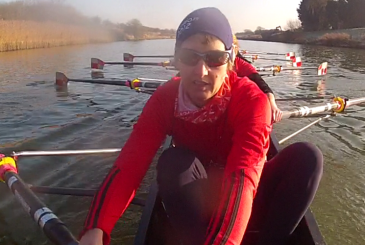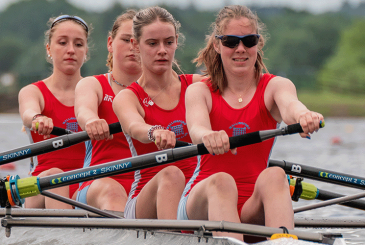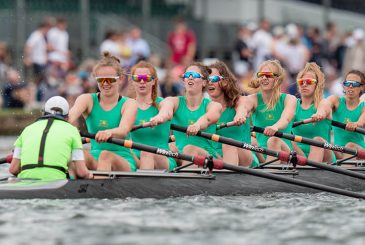Meeting either academic or rowing goals requires a lot of hard work. GB Rowing Team athlete Heidi Long explains how to achieve both by paying attention to the fundamentals of organisation, prioritisation, and communication.
Organisation: Set your goals and make a plan
Just as a well-organised tool kit helps you find the right tool quickly, effective organisational skills are crucial for balancing rowing training commitments with academic pursuits.
Start by defining your goals. You need to be clear about what you want to achieve on and off the water so that you can make a plan to succeed. While you probably have your ultimate dreams – top marks and gold medals – breaking these down into manageable short and long term goals ensures focus and organisation.
Familiar with the popular SMART goal-setting approach? The method works by creating goals which encompass the five elements of SMART. I used this method each semester when I was at university to make sure I was progressing towards my degree and to stay on top of my work load. Here is an example of how I made my goal for one of my biology classes.
SMART
| Specific | Get an A in my Biology final exam |
| Measureable | Score 90% or above |
| Achievable | I got a B+ in my last exam so I believe I can increase one grade with enough studying and by using feedback |
| Relevant | This will improve my grade point average (GPA), which will help my longer-term goal of graduating from my Biology degree |
| Time-bound | The exam is in 5 weeks time |
After setting your goals, devise a plan to achieve them. Whether it’s a revision timetable, a tailored training program alongside your studies, or a meticulously organised calendar to track exams and competitions, adaptability is key. As life throws curveballs, being able to recalibrate your goals and plans is essential for sustained progress.
Prioritisation: Knowing what’s most important each week
Similar to selecting the most important tool for the task at hand, setting clear priorities helps you concentrate on what truly matters throughout the season. Being aware of important exams or deadlines alongside big races or training blocks empowers you to prioritise effectively.
For example, during a week in February with an important assignment deadline looming as well as rowing trials, work with your coach to reduce your training mileage but make it more race-specific. This will give you more time and energy to complete your academic work but still be ready to excel on the water at the weekend.
Writing a weekly to-do list can be a great way to prioritise. Put the most urgent tasks at the top and strategically work your way through. There are lots of ways you can do this, I like writing them out by hand or using “reminders”, but Microsoft To-do or Trello are other easy and effective way to create a prioritisation list. Most importantly, don’t forget to reward yourself for each accomplishment along the way!
Communication
The tools in a tool kit are used together to get the job done. Similarly, if you maintain open communication with your coaches, teachers/professors, teammates and support networks, you will receive the assistance and understanding in both areas.
Never be afraid to ask for help! Your coaches and educators are invested in your success, so they’re there to support you. Share your goals and your plan with both so everyone is clear about what you’re trying to do.
Keeping your coaches informed about your major academic commitments and informing your teachers/professors about your rowing obligations will help everyone to find an effective balance and enables you to approach both for flexibility and understanding. For instance, communicating with your coach to adjust training the day before a significant exam can provide valuable prep time and mental clarity.
5 top tips from 5 GB athletes
Make every 10 minutes count! – James Robson, Men’s Sweep
Even if you can’t dedicate an hour, maximise the time you do have. When you are productive for shorter periods throughout the day it will add up.
Compartmentalise – Kyra Edwards, Women’s Sweep
“Row when you are rowing, study when you are studying.” Stay dedicated to the task at hand at each point of the day. When you are at training focus on rowing and how you can get the most out of your session and when you are studying, or in class, stay focused on that subject. Too much multitasking can be unproductive and inefficient.
Limit social media – George Bourne, Men’s Sculling
“Reduce the amount of time you spend on social media.” You can use apps or your phone settings to control the amount of time you spend on social media. This will give you more time to study, recover and sleep.
Time management – Saskia Budgett, Women’s Sculling
“Find a routine that suits you.” Streamline a daily schedule that works best for you, incorporate power naps, structured studying, study breaks, meal times, travel, recovery techniques and relaxation to maximise recovery and well-being. You can maximise the hours in the day by using rowing as a study break and studying as a physical break.
Be proactive – Tom Ford, Men’s Sweep
“Work during downtime.” Cultivate a habit of tackling assignments and homework promptly rather than waiting until the last-minute. You can use downtime from training for studying.
Stay resilient, stay focused and enjoy!
It’s definitely possible to be both a student and an athlete. The journey of balancing your academics and rowing is not just about the results, though. Relish the challenges, learn from setbacks and most importantly enjoy sharing it with friends and those around you!










